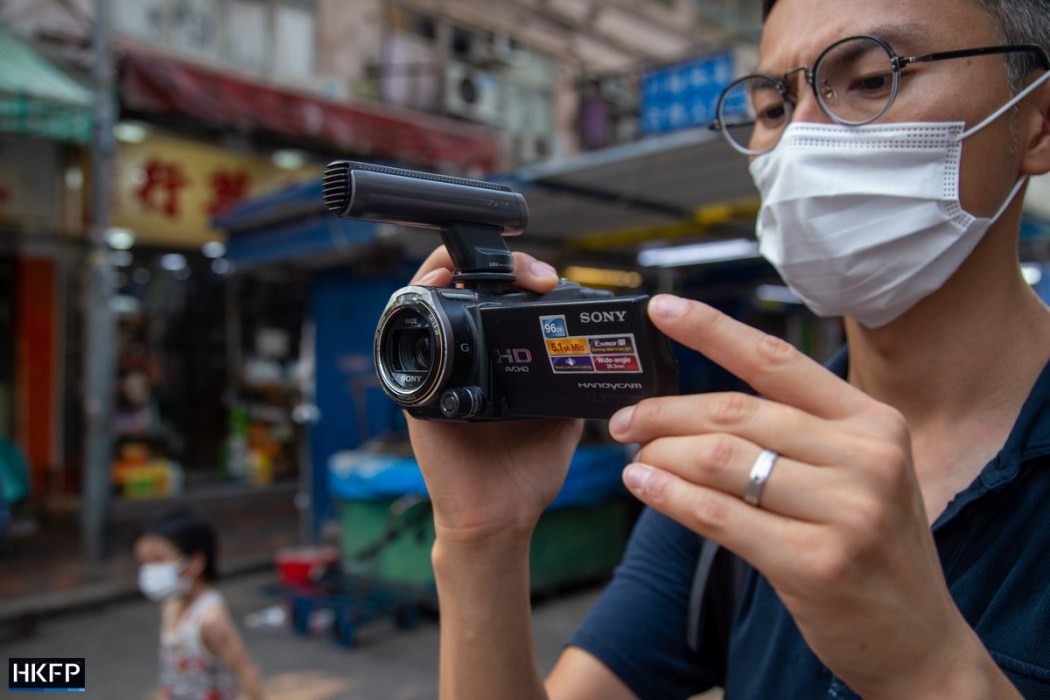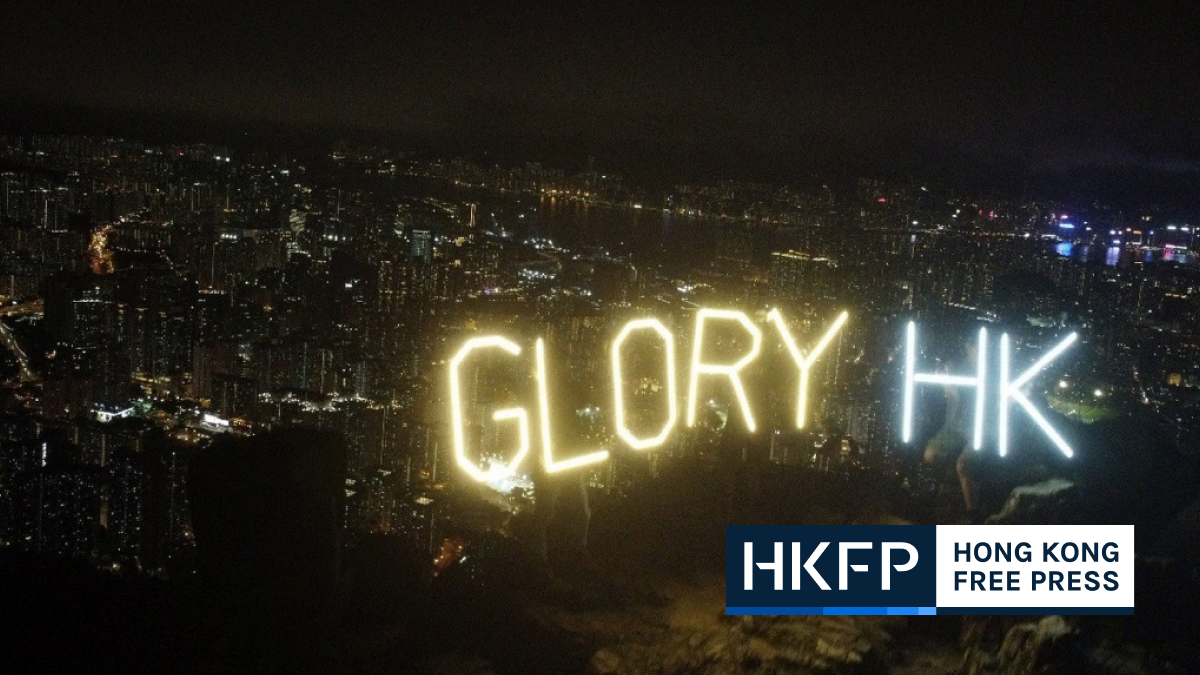Hong Kong director Kiwi Chow, who startled the city by premiering protest documentary Revolution of Our Times at the Cannes Festival last month, said he wants his film to act as an “emotional vent” for Hongkongers amid “trauma” from the 2019 unrests and fears arising from the national security law.
The 152-minute documentary, which chronicled the months-long pro-democracy protests triggered in June 2019 by a now-withdrawn extradition bill, had been Chow’s top-secret and high-stakes project for the past two years.

When Revolution of Our Times made an unusual debut in France on July 16, the 42-year-old filmmaker heaved a sigh of relief. He was thrilled for the world to see his work, which aimed to offer an up-close and personal account of what happened on the protest frontlines.
But Chow’s friends did not share his excitement. Many were worried about the repercussions the director may face after he went against the current of “laying low” under the Beijing-imposed security law and attached his name to the politically sensitive film.
A friend of Chow even offered to take his place, saying they would not mind going to prison for the award-winning director whose career took off after producing romance drama Beyond the Dream in 2019.
Chow, however, declined this altruistic offer.
“I did not want to resign myself to fear. I think that is very shameful. My documentary was people-based. All of my interviewees – whether they showed their faces or not – were taking immense risks. If I hide, how ugly and shameful is that?” he asked.
Power of images
In a recent interview with HKFP , Chow said he had always wanted to record social movements through his lens. But during the 2014 Umbrella Movement, his wife was pregnant with their first child and he did not want to leave her side.
Chow’s wife was expecting another baby when the anti-extradition bill protests erupted. He was again hesitant about filming on the frontlines, but the storming of the Legislative Council (LegCo) on July 1 that year changed his mind.
“The scenes inside LegCo were captured by [former] Stand News reporter Gwyneth Ho, which allowed other Hongkongers including myself to experience the event despite not being there. That is the power of images,” he said.

After securing funds from an investor in mid-August 2019, Chow knew there were “no more excuses.” With a family camcorder in hand, the director dashed out into the streets on August 31 that year, when the city saw widespread violence.
The day also marked the police storming of the Prince Edward MTR station to make arrests, an operation which later led to false rumours of deaths.
Chow said he was “very disappointed” when he failed to film the scenes in the metro station, saying it was the “most important incident” on that day. But the experience also inspired him to shadow individual frontline protesters, in a bid to put his finger on the pulse of the fast-changing demonstrations.
An emotional vent
Thanks to his short vignette Self-immolator, which was one of the five stories in the famed dystopian film Ten Years, Chow had little difficulty in finding protesters who were willing to let him and his videographers follow them around the frontlines.

The filmmaker said he had formed a trusting relationship with his subjects and stayed in touch with them during the editing process. One of them was arrested, while some had fled the city.
Chow recalled how one suffered an emotional breakdown in front of him while they were trapped in the Hong Kong Polytechnic University, which was besieged by riot police for two weeks in November 2019.
The tearful protester, who was a “team leader,” hugged Chow and said he could not find any way to leave the university. Police had said those who walked out of the Hung Hom campus would be arrested for rioting, which is punishable by 10 years in prison.
“I hugged him back and I cried too. I was like a vent for his emotions. Another protester said he had a lot of secrets and he could not tell anyone. But he wanted to let people around the world know, through my lens,” Chow said.
“Allowing me to film them was a kind of [emotional] release for them, some sort of comfort, or at least a kind of companionship.”

His film was also as a outlet for the emotions Hongkongers could not express. Many now fear that discussing the pro-democracy movement publicly or showing support for the protests may breach the sweeping security law.
“The year of 2019 was traumatising. But when people cannot even talk about this distress, it is like being traumatised for the second time,” Chow said.
The national security law enacted on June 30 last year outlaws secession, subversion, collusion with foreign forces and terrorist acts. At the end of the first trial last week activist Tong Ying-kit was handed a precedent-setting jail term of nine years, after he rammed his motorcycle displaying the slogan “Liberate Hong Kong, revolution of our times” into three policemen in a protest last July.
The court ruled that the phrase – improvised by former localist leader Edward Leung and popularised during the 2019 protests – was capable of carrying the meaning of separating Hong Kong from China.
Asked if he was worried that the court ruling would mean his film title may be in breach of the security law, Chow said he could not worry too much.

“I think it is a comprehensive name… I wouldn’t give it too much thought. As long as I think my risk assessment was sufficient, then that’s enough, [Otherwise], I would be imprisoned by fear.”
‘Death penalty’
Chow told HKFP that he knew his protest documentary would have little chance of being screened at local cinemas. He has abandoned the idea of hosting underground screenings, to avoid embroiling venue providers.
He said the day when he decided that Revolution of Our Times could only be shown to foreign audiences was when the government introduced amendments to the Film Censorship Ordinance in June.
The Film Censorship Authority was instructed to be “vigilant” against the depiction of “any act or activity which may amount to an offence endangering national security” in vetting whether films are appropriate for public screening.
“It felt like a death penalty was handed down,” Chow recalled.

In a move to mitigate risks, Chow sold the copyright of his documentary to a friend based overseas. The raw footage was shipped abroad to protect the safety of those filmed.
The filmmaker has also lined up a lawyer, in case of any legal ramifications resulting from producing the protest documentary.
“The footage was taken away, I’m not the copyright holder, the film can still be published if anything happens to me – this is what makes me feel relieved and relaxed,” he said.
A man who cries
Sifting through a vast amount of footage for the documentary for over a year was not only physically taxing, Chow said, it was also emotionally draining. He said he cried throughout the editing process, as he had to “force” himself to immerse in the intense emotions felt during the protest movement.
“Facing that footage almost every day for two years was tough. I never detached myself from those emotions,” he said.
But crying was Chow’s way of “getting stronger” and a way to communicate to his six-year-old son about the potential “suffering” he may face in the future.
“I would hug him and cry in front of him. I never withhold my emotions and worries in front of him. I also brought him picture books to teach him what democracy and totalitarianism is,” he said.

Hong Kong has seen an exodus of families since the national security law was implemented last year. While Chow’s anxious friends urged him to quit the city in pursuit of a safer future with his family, he is adamant that he will stay.
Chow said there was no need for him to leave, as he wanted to “follow Jesus Christ” and “bear witness” to what happens in his home city.
“All of my thoughts and behaviour should not be determined by the so-called red lines under the national security law. I should be led by the teachings in the Bible,” he said.
“I wouldn’t leave Hong Kong for my son… he follows me and he follows Jesus Christ,” he added.
Upcoming projects
Following the premiere of the documentary, Chow admitted that an investor had pulled out from his upcoming film – a romance drama. The project is on hold as he searches for other investors.
The filmmaker may no longer be able to secure government funding after his application for financial assistance from the Hong Kong Art Development Council submitted in late 2020 went unanswered. Chow also doubts that any major film companies will be willing to fund him.

“If I can’t find any, then it means investing in a romance film also has this kind of risk assessment – then you can see how terrifying Hong Kong has become.”
Still, Chow said he would continue to “create” by writing screenplays. He said whether he has films to make was a secondary concern: being creative and pursuing the art of film is his ultimate goal.
“I don’t care much about my film career, I care more about the art of films. The pursuit of art, the pursuit of my faith. And with art, you need to take risks, you need freedom and justice. “
Support HKFP | Policies & Ethics | Error/typo? | Contact Us | Newsletter | Transparency & Annual Report | Apps
Help safeguard press freedom & keep HKFP free for all readers by supporting our team

























